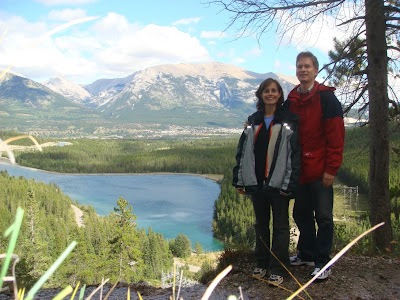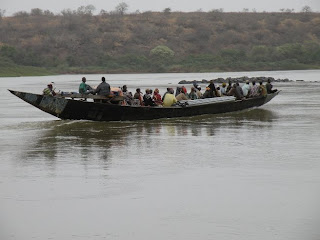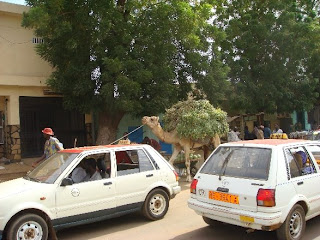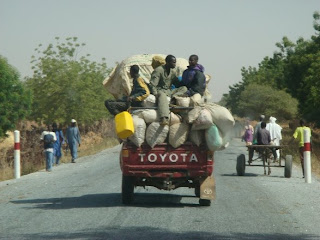 In the fall, you often see large flocks of birds (often Canada Geese) flying south for the winter in V-formation. Honk, honk, honk. But I wasn’t expecting to see herds of over 100 Canada Geese grazing on open areas of green grass in the city! It seems so strange to see “birds” grazing on grass and not goats and sheep, like what we would expect in Niger.
In the fall, you often see large flocks of birds (often Canada Geese) flying south for the winter in V-formation. Honk, honk, honk. But I wasn’t expecting to see herds of over 100 Canada Geese grazing on open areas of green grass in the city! It seems so strange to see “birds” grazing on grass and not goats and sheep, like what we would expect in Niger.The best way to get to know a new community is to get out and explore it on foot. That’s exactly what Tim and I did when we were living in Toronto in the early fall. Everything was very convenient (walking, biking, subway) where we were temporarily lodged near “Little India” just south of the Danforth. (We loved being so close to Indian food. Yum!) We slowly adjusted to the cooler fall weather by getting outside daily. When we left Toronto, the leaves were just beginning to fall from the trees, whereas the leaves in Ottawa had long since fallen when we arrived there the same day.
Getting to know your community changes though when the temperatures fall and the weather isn’t so nice to be outdoors. November in Ottawa/Gatineau wasn’t as warm as Toronto was in September and October. Our method of getting to know our neighbourhood consisted mainly of driving around and most importantly using Mapquest and Googling things on the internet. Thank goodness we have access to wireless internet at our apartment! What a change from Niger where you depend so much on the locals and face-to-face conversations to get to know your community.
I don’t think I experienced much “reverse culture shock” upon our return to Canada from Niger. Reverse Culture shock is when you feel disturbing emotions when re-entering your home environment. Tim and I were shopping in the large mall in our old neighbourhood our first weekend back in Canada. It didn’t phase me at all. I just accepted the fact that we were back in the affluent and consumerist West…that’s how life is here. It wasn’t until 3 months later when I stepped into a large “Chapters” bookstore that it hit me. “Chapters” is not just a bookstore. No. Now it’s a stationary store, a gift shop, a coffee shop, a clothing store, a linen store, a toy store, a meeting place for friends, a candy shop, a “one-stop-shopping”store. It’s so BIG, it’s actually overwhelming!
Winter is here! My first impressions after 2 years in a snowless country.
“What is this cold, fluffy, foreign substance? Ohhhh, it’s cold when you step into deep snow and it goes down your boots!”
“I’m not going outside unless I have long-johns under my jeans!”
“Bundle up. Wear your hat (toque), scarf and warm mittens. It’s cold outside, especially when you take into account the wind-chill factor of -25 degrees Celsius!”
“I think I’ll just soak in the sun and enjoy the view while sitting here on the comfy sofa.”
“Fluffy, white snow is truly a gorgeous sight. Just keep it nicely on the ground and not down my neck, thank you!”
It has certainly been a pleasure to watch the seasons change from our patio door looking out onto the Ottawa River. Waking up each morning to a beautiful view. Calm waters as clear as glass. Mist over the water. Lapping water against the shore. Stormy waves crashing on the beach as though you were at the ocean! Ice forming along the shoreline. Ice and snow sparkling in the sun. Ice flows floating down the river. One day I’m sure we’ll wake up and see the river almost frozen except for maybe the middle.



















































